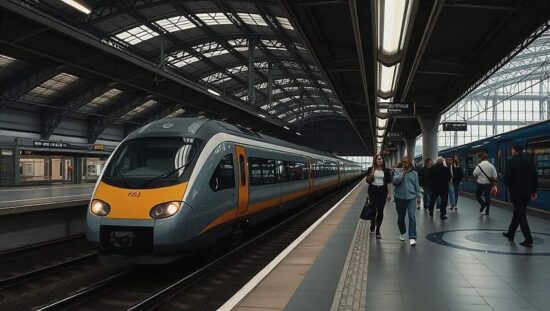Reports have surfaced, based on an internal document from Deutsche Bahn (DB), indicating a significant restructuring of long-distance rail services planned for 2026. The extensive 183-page document, revealed by “Der Tagesspiegel”, allegedly outlines a shift in focus toward more profitable routes and business travelers, potentially leading to a reduction in services across a wider network.
Specific routes potentially affected include direct connections between Berlin and Westerland (Sylt), as well as services linking Hamburg to Berchtesgaden/Oberstdorf. Proposed changes also involve halving the frequency of trains to Lake Constance and Garmisch and the discontinuation of the Railjet Frankfurt-Stuttgart-Lindau-Arlberg route.
The potential adjustments extend to several other locations. Tübingen and Lübeck could become disconnected from the long-distance network, while the Stuttgart-Norddeich service crucial for ferry connections to the North Sea islands and the extension of the ICE line from Frankfurt to Rostock, may also be eliminated.
Kiel is reportedly facing the loss of direct connections to Cologne, Munich and Basel. The “Prinz Eugen” route, a long-standing direct service between Hamburg and Vienna via the Bavarian Forest and spa region, is also slated for removal.
The document suggests disruption to numerous direct connections from Frankfurt through Stuttgart to Austria and the ICE Line 20, losing connections in Basel and ceasing service into Switzerland. The formerly successful Intercity Line 26 between Hannover, Marburg, Gießen and Frankfurt could also see a reduction in frequency. Furthermore, a train pair on the Dortmund-Siegen-Frankfurt line is projected to be removed, with a complete discontinuation planned from 2027.
Deutsche Bahn has disputed the report, stating that the opposite is accurate, maintaining a high volume of services and expanding where demand warrants. The company acknowledged “construction-related, seasonal and demand-related adjustments” describing the timetable as a “dynamic construct”. They also claimed that parts of the information are inaccurate and emphasized that direct services between Berlin and Westerland will resume after the modernization of the Hamburg-Berlin line in May 2026.
A spokesperson for the Federal Transport Ministry echoed the partial denial, linking the alleged changes with the upcoming presentation of a new strategy. The final timetable will be unveiled on September 22nd, when Transport Minister Schnieder is expected to announce the state-owned company’s new direction and potentially a new CEO.





